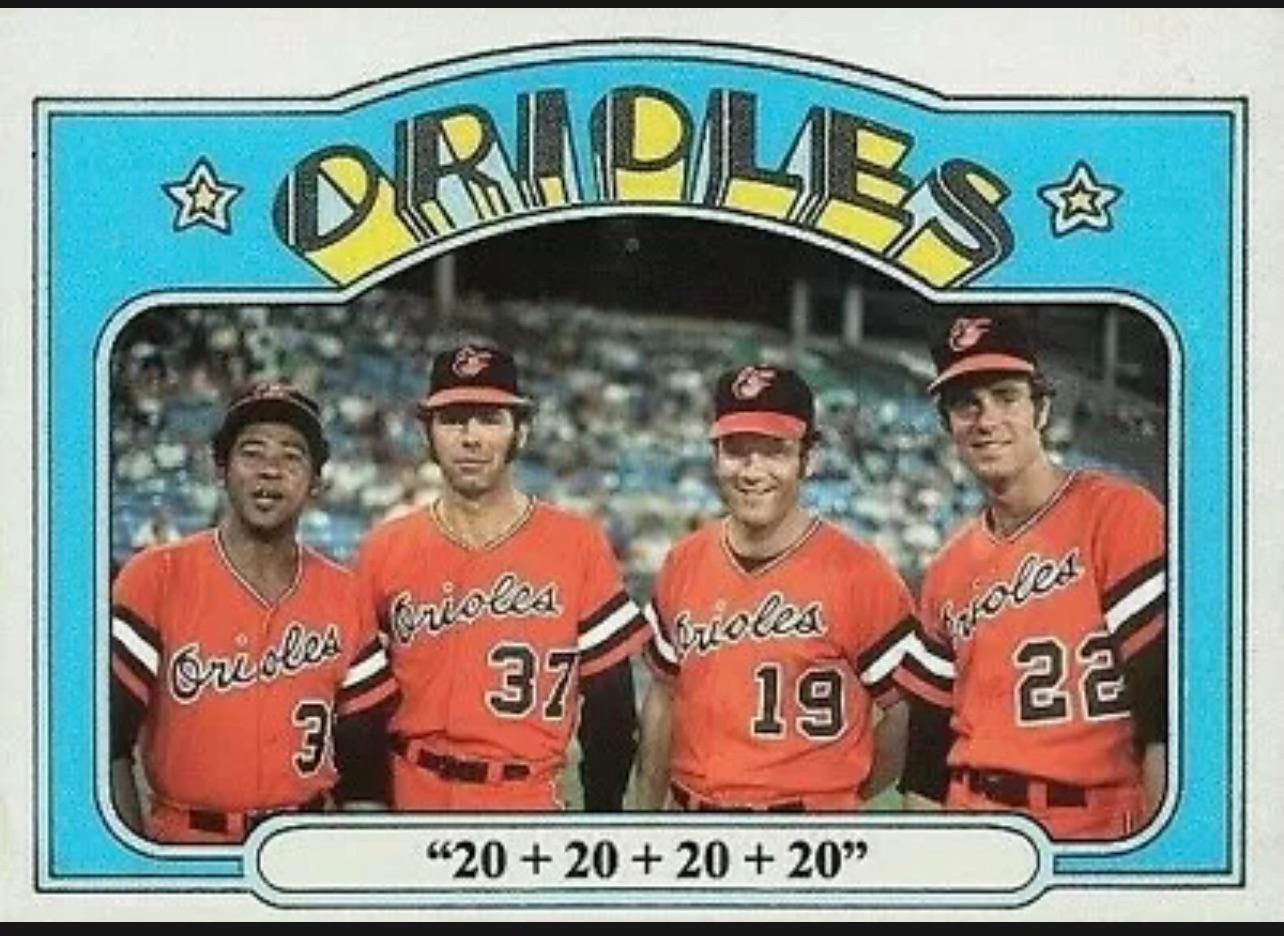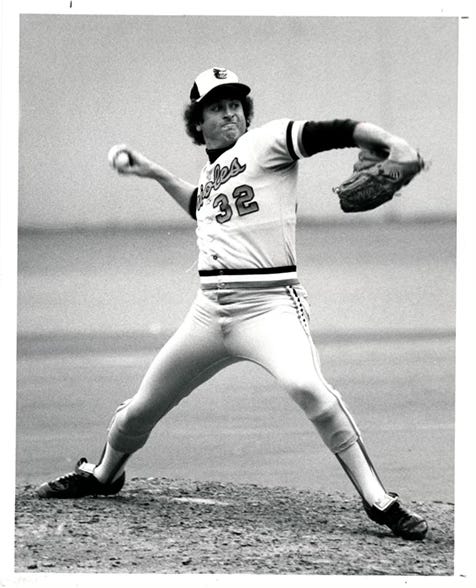The (Very) Long Wait for Another 20-Game Winner
If you're like me, while listening to Mike Flanagan's vintage interview, you stopped, did the math and wondered if it really had been THAT long since an Orioles pitcher won 20 games in a season.
Wait … are those numbers accurate?
Is all that really true?
That was my initial response as I recently listened to my vintage interview with Mike Flanagan from a quarter-century ago and he detailed a statistical trend about the Orioles’ pitching that had me shaking my head in surprise.
Maybe his revelation surprised you, too, if you heard the Flanagan interview, which I posted at the Bird Tapes earlier this week and is available to paid subscribers.
He was discussing the golden age of Orioles pitching, from the late 1960s through the early 1980s, when a succession of starters including Dave McNally, Mike Cuellar, Jim Palmer and Flanagan helped keep the Orioles among the American League elites.
“I looked it up,” Flanagan told me in 1999. “From the franchise’s beginning (in 1954) through 1968, the Orioles had one 20-game winner. And then, more recently, since 1984, they’ve had one 20-game winner.”
He continued: “So that’s one over a 15-year period early and then one over a 15-year period lately. But in between those two periods, there were 21.”
Listening, I thought, “Seriously? The boom-or-bust disparity is that extreme?”
I went straight to baseball-reference.com, the site where so many baseball questions are answered. It took some rooting around, but in the end, the numbers were easy to access and Flanagan’s assertion was almost entirely accurate.
Yes, from 1954 through 1968, the Orioles had just one 20-game winner. It was (drum roll, please) Steve Barber, the Takoma Park native who won 95 games over eight seasons in Baltimore. He went 20-13 in 1963. (Spoiler, next Monday I’ll post the first half of my vintage interview with Barber from a quarter-century ago.)
Flanagan erred ever so slightly in calculating the franchise’s more recent drought of 20-game winners. When we spoke in 1999, he correctly noted that the Orioles hadn’t had one since Mike Boddicker went 24-11 in 1984. That was 15 years earlier. But Boddicker actually was the only 20-game winner since 1980, an even longer period.
Incredibly, that latter dry spell is ongoing. Boddicker is still the Orioles’ most recent 20-game winner - yup, now 40 years ago, in 1984.
As for the golden era between those dry spells, Flanagan nailed it. Yes, various Oriole starters recorded an astounding 21 20-win seasons between 1968 and 1980. Palmer did it eight times, McNally and Cuellar four times apiece. The last four were Flanagan in 1979, Steve Stone and Scott McGregor in 1980 and Boddicker in 1984. (See below for the entire list of 20-game winners in Orioles history.)
Mike Mussina came close in 1996. He had 19 wins entering his last start of the season, in Toronto, and left the game with a 2-1 lead after limiting the Blue Jays to four hits over eight innings. But the Orioles’ closer, Armando Benitez, blew the save in the bottom of the ninth. (I know. I was there.)
Mussina had four seasons of 18 or more wins while with the Orioles. but he never reached 20.
Flanagan referenced the 21 20-game winners while seeking to emphasize what went right, so right, during the era when he pitched. His Bird Tapes interview includes some of the best insight I’ve heard into the system that was in place, overseen by manager Earl Weaver and pitching coaches George Bamberger (1968-1977) and Ray Miller (1978-1985).
Flanagan explained that the team’s philosophy was based on the starter going nine innings. It was more than expected. It was demanded. And although they had different arsenals of pitches, the starters were taught a specific way to last nine innings. They should rely on as many fastballs as possible to get through the fifth inning as quickly as possible, and then start mixing in off-speed stuff later.
Commanding your fastball was the first priority. Flanagan recalled charting a game from the dugout in which 116 of Palmer’s 122 pitches were fastballs. A teachable moment, for sure.
Palmer, in his Bird Tapes interview, credited the nine-inning philosophy with getting him into the Hall of Fame. As much as he and Weaver feuded over who knew more about pitching, Palmer greatly appreciated that the manager left him in games in the late innings to decide his own fate, as opposed to turning to the bullpen.
Flanagan referenced the same principle in his interview, citing a start in which he pitched 13 innings against the White Sox (and got the win when the Orioles executed a trick play).
The bottom line: Staying in games helped the starters collect more wins.
Flanagan also broke down how young starters were groomed for the job. When the front office deemed them ready for the majors, they came up and spent a year in the bullpen, helping them prepare for what was coming. After serving what amounted to a yearlong internship, they joined the rotation.
Teamwork and the greater good governed the environment, as opposed to individual concerns. Flanagan never forgot Cuellar working with him for hours when he first arrived in the majors — a selfless gesture in his mind, considering Flanagan was there to take Cuellar’s job as the left-hander in the rotation.
“It wasn’t like that on other teams,” Flanagan told me. “(Veteran) pitchers would withhold information (from younger teammates). The attitude was, ‘I figured it out so you figure it out.’ I’ve seen that on other clubs. Here, it was ‘let me help you as much as I can.’”
Of course, pitching in the major leagues has undergone a profound transformation since the early 1980s. Teams, coaches and players now rely on vast reams of intricate data pinpointing such specifics as how much a ball spins, which locations generate better results and expected outcomes. The emphasis is on throwing hard, building deep bullpens, and getting the best of late-game matchups. It’s rare for a starter to last beyond six innings
A byproduct of these changes is the de-emphasis of wins in many minds. Once viewed as the ultimate measure of pitching success, wins are now considered a secondary metric behind wins above replacement and other advanced calculations.
Not surprisingly in such an environment, winning 20 games in a season has become a lost art. There’ve only been three 20-game winners in the majors since 2017.
With an 11-3 record on a first-place team nearing the All-Star break, the Orioles’ Grayson Rodriguez certainly is positioned to make a run at winning 20. So is Corbin Burnes, a true ace with nine wins.
I’m not sure the champagne will flow if either becomes a 20-game winner this season. Honestly, I’m not sure anyone will really care.
But if anything, after four decades without a 20-game winner, the Orioles are due.
Here’s the Orioles’ complete list of 20-win seasons:
1963 - Steve Barber (20-13)
1968 - Dave McNally (22-10)
1969 - Mike Cuellar (23-11), Dave McNally (20-7)
1970 - Dave McNally (24-9), Mike Cuellar (24-8), Jim Palmer (20-10)
1971 - Dave McNally (21-5), Jim Palmer (20-9), Mike Cuellar (20-9), Pat Dobson (20-8)
1972 - Jim Palmer (21-10)
1973 - Jim Palmer (22-9)
1974 - Mike Cuellar (22-10)
1975 - Jim Palmer (23-11)
1976 - Jim Palmer (22-13), Wayne Garland (20-7)
1977 - Jim Palmer (20-11)
1978 - Jim Palmer (21-12)
1979 - Mike Flanagan (23-9)
1980 - Steve Stone (25-7), Scott McGregor (20-8)
1984 - Mike Boddicker (24-11)







I was also there for that trick play in 1979. DeCinces distracts the pitcher Guy Hoffman by stumbling toward second as Eddie Murray stole home. Still can't believe Weaver had that one in his playbook (and a sac bunt that inning). Must have been reserved for rookie pitchers. Funny, I remember that inning of that game like it was yesterday. First date with a new girlfriend.